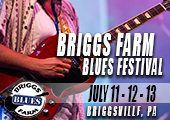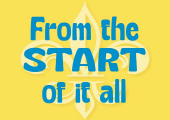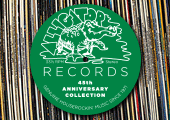WEE WILLIE WALKER
If Nothing Ever Changes
Little Village Foundation – LVF 1004
If enough of the right people hear If Nothing Ever Changes, Wee Willie Walker’s world will change, and he will become the award-winning, highly sought-after soul/blues singer he has deserved to be since the 1960s.
Walker decided early in his career, as a member of gospel’s Redemption Harmonizers, to live off the blues’ beaten track in Minnesota’s Twin Cities. Returning briefly in the late ’60s to Memphis, where he spent his boyhood, he began recording great secular works for Goldwax Records, which leased four of his sides to Chicago-based Checker Records. Walker, unfortunately, wasn’t able to gain a strong foothold in the soul communities in Chicago, or down South, and returned to Minneapolis for good.
Created at California’s Greaseland Studios and released on former Robert Cray Band keyboardist Jim Pugh’s new Little Village Foundation label, If Nothing Ever Changes could remedy that injustice. It is nothing short of a soul/blues epiphany. In a current blues world filled with good records that sometimes fall short of spectacular, Walker and company’s effort here is highly newsworthy because it is virtually devoid of shortcomings. If Nothing Ever Changes is a dozen songsʼ worth of superb composition, selection, production, sequencing and artistic execution.
The disc’s offerings are considerably varied, yet somehow come across with a comforting, wonderful cohesiveness. Walker retains his greasy soul vocals, and with considerable range and frequently sublime subtleness and beauty, the under-recognized master cruises his way through this 47-minute session.
Disc highlights include an almost unrecognizable version of the Beatlesʼ Help, performed as a duet with Curtis Salgado. Bobby Rush comes to mind during the voyeuristic I’ve Been Watching You. Walker then slows the pace to that of a snail on the touching, gorgeous Not That I Care (a minor country hit by Jerry Wallace in 1966). Funk, soul and Wee Willie collide on the emotional I Don’t Remember Loving You (a Top 10 country hit by John Conlee in 1982). Closing the album is Hymn for Lonely Hearts, a song in that, in the good old days of black AM soul/blues radio, would have been deemed so solid the DJ would play it twice—back-to-back—making it the perfect “twin-spin.”
Shades of Walker’s late, Goldwax Records colleague James Carr can be sensed throughout the record, along with the spirits of Otis Redding (as evidenced on the hard-socking Everybody Meets Mr. Blue, one of two compositions in the set by the late Eddie Hinton) and Little Milton. Hints of Syl Johnson’s vocal style are also evident. There is no mistaking, however, this is a major league musical statement being made by Walker and Walker alone, with sympathetic support from his perfectly chosen backing band, along with producers Rick Estrin, Kid Andersen and Jim Pugh.
Not enough good things can really be said for this singer’s comeback record. All the way down to its tasteful, if somewhat austere packaging, the disc is a delight to have near a spindle. Hopefully followers of soulful blues music worldwide will give Willie Walker a listen this time around, and the man will enjoy a long-overdue career renaissance.
—Steve Sharp
JERRY LAWSON
Just a Mortal Man
Red Beet Records – RBR CD019
Lead singer, producer and one of the founding members of the great a cappella group the Persuasions, Jerry Lawson recently released his first solo effort at the seasoned age of 71. Recorded in Nashville and featuring extremely talented musicians from the area, Just a Mortal Man expertly navigates multiple genres—blues, R&B, soul, country, rock ’n’ roll, pop, even reggae/dub—without sacrificing clarity of vision or consistency of sound. In fact, Just a Mortal Man is deeply rewarding because Lawson’s music transcends the sum of the disc’s diverse influences through its brilliant interplay of musical virtuosity combined with emotional and spiritual pathos.
This 13-song set includes four numbers by guitarist Eric Brace as well as compositions by both well-known (Paul Simon’s Peace Like a River) and more obscure songwriters (Alan Brace’s Never Been to Memphis). Lawson co-wrote Woman in White. He sings about aging and mortality in the title song, the perils of alcohol in Wine and the road in Never Been to Memphis. Lawson’s excellent version of Paul Simon’s Peace Like a River is the most socially conscious song on Just a Mortal Man. His understated, haunting vocals accentuate the message of resolve against oppression and victimization: “You can beat us with wires / You can beat us with chains / You can run out your rules / But you know you can’t outrun the history train / Seen the glorious day.” The remaining songs are about love—love and ecstasy, love and disappointment, love and hope.
While important, the lyrics are secondary to Lawson’s voice and the music. A beguiling mix of weathered gruffness and smooth sweetness, Lawson’s voice is a true treasure, and his phrasing on Time and Water (“Will you be holding me when the day is done?”) and Members Only (“And it’s members only tonight”) is spine chilling. Accompanying his great voice is the music, and it is simply entrancing. This is low-key atmospheric stuff, somewhat reminiscent of the cohesive sounds found on, for example, Bob Dylan’s Oh Mercy and Beck’s Morning Phase. Slide guitar, horns, strings, echoing guitars, keyboards (along with the excellent rhythm section) coalesce around Lawson’s voice and the individual meanings of each song.
I hope Just a Mortal Man is not a one-off affair. Lawson has proven that he can succeed as a solo artist outside the a cappella tradition. Indeed, he has produced a disc that, in his own word, is “timeless.”
—Stephen A. King
OMAR COLEMAN
Born & Raised
Delmark – DE 840
A driving force in Chicago’s newer generation of blues harmonica players, Omar Coleman started achieving greater national recognition a decade ago when he was tapped to appear on Diamonds in the Rough, the first release in Severn Records’ two-part Chicago Blues Harmonica Project. A barber in a former life, Coleman did not start playing harmonica until he was already in his mid-20s (he practiced blowing at work between customers).
Things moved quickly for the fledgling artist, with open jam sessions at Legends and other Chicago clubs leading to a European tour with Sean Carney and an independent release on the Honey Bee label. With his debut on Delmark, Coleman is poised to broaden his fan base even further with Born & Raised.
Delmark assembled a crack band for the studio sessions, with guitarist Pete Galanis, pianist Neal O’Hara, bassist Ari Seder and drummer Marty Binder providing solid support throughout. Additional guest guitarists include Mike Wheeler, David Herrero and recent Alligator signee Toronzo Cannon, who dazzles with his solos on the straight-up shuffle You Got a Hold On Me.
Discerning listeners will undoubtedly hear shades of Junior Wells in Coleman’s punchy, staccato-like harp leads, with occasional flurries of baroque phrasing that evince the influence of Sugar Blue, who mentored him early on in his career. Heavy doses of funk are on display with Born and Raised and Sit Down Baby, and Coleman surprises with a pair of soulful ballads in One Request and I Was a Fool.
Coleman’s previous projects have been respectable efforts, but with Born & Raised he has clearly taken a major step forward. The album bears the mark of an artist who is appropriately confident in his abilities as a singer, harmonica player and songwriter (he wrote or co-wrote 12 of the 14 tracks), and who is steeped in the classic blues sounds of his home city yet unafraid to take them in a more contemporary direction. It is a pleasure to hear how his sound continues to mature and evolve.
—Roger Gatchet
TAD ROBINSON
Day Into Night
Severn – CD-0065
It has been a little over a decade since New York City native Tad Robinson recorded Did You Ever Wonder?, his first album with Severn Records. Day Into Night, his fourth outing for the label, may be his finest yet. This should come as little surprise to those who have followed his career since his days working with Dave Specter and Delmark in the1990s. Simply put, Robinson has consistently topped previous efforts with each new release.
Robinson’s greatest strength is his vocal ability and range, which sound custom-built for the style of soul-blues that has become his signature sound. An expressive tenor who wrote (or co-wrote) most of his own material for this release, Robinson also draws on sparse melismatic phrasing, biting falsettos and gutbucket growls as the mood and material suit him. Call Me stands out as a highlight on an album that is full of strong moments. One version of the song glides along Kevin Anker’s keys as Robinson, alternately evoking Al Green and Otis Redding, croons, “So baby leave me a message / Stop by if you could be so kind / Because it’s getting to the point / Where I’m about to lose my mind.” An alternate second take, this time taking full advantage of a four-piece horn section, closes the album.
In addition to Anker, drummer Robb Stupka and bassist Steve Gomes all return from Robinson’s previous release, and labelmate Johnny Moeller takes a break from his full-time gig with the Fabulous Thunderbirds to handle lead guitar duties (Moeller is in good company with fellow veteran guitarists Anson Funderburgh and Alex Schultz, who also make guest appearances).
Robinson is primarily praised as a singer, but he is also an underrated harmonica player who can easily hold his own with many of the top players on today’s scene. He tends to incorporate the instrument only sparingly in his studio work, as is the case here—the groovy blues While You Were Gone, with its crisp, third position fills and solos, is the lone track that features harp. Although it would be nice to hear him blow a bit more, this is an A+ effort from beginning to end. Without question, Robinson has joined the ranks of those who continue to set the standard for contemporary soul-blues today.
—Roger Gatchet
HANS THEESSINK & TERRY EVANS
True Blue
Blue Groove – BG 2520
The transatlantic duo of Hans Theessink & Terry Evans recorded this live performance at the Metropol in Vienna, Austria. The liner notes don’t mention a recording date, while a page was dedicated to reminders of their successful past collaborations Delta Time with Ry Cooder (2012) and Visions with Richard Thompson (2008), perhaps because True Blues directly continues that series musically, though in a live forum. Terry Evans, from Vicksburg, Mississippi, attained popularity as a singer with Ry Cooder, often in harmony with soul/gospel vocalist Bobby King. He’s performed with the best, including John Lee Hooker, Eric Clapton, John Fogerty and many more. Hans Theessink, originally from the Netherlands, makes his home in Vienna. The bard has established himself over the last five decades as the undisputed champion of the Euro-acoustic blues. Together the pair forms one of the most prominent acoustic blues duos of our time, uniting the golden Mississippi voice of Evans with the deep-roots musicality of Theessink.
To be accepted as a European acoustic bluesman you need to be especially good. Singer/songwriter and guitarist Theessink broke that barrier long ago. He is accepted in America by his fellow musicians, and even by the most discerning audience.
The first thing that becomes evident in this live recording is the good vibe, the friendly spirit that exists between these two musicians. They are friends having fun, enjoying their music together. True Blue showcases the pair without special guests. No powerhouse guitarists adding big names to the gig. The duo complements each other well in an easy, intimate setting unadorned and sparse, with a lighthearted, back-porch mood, but they get fierce in just the right moments, working the appreciative audience like the two old pros they are. The people seemingly love it and get into the spirit of the show, a perfect setting for a live recording. Theessink’s ethereal and light baritone is passable, but when Evans joins in, either as lead singer or background, the songs are gloriously lifted with sweet harmonies, and Theessink can rely on his strengths—superb guitar instrumentation and strong songwriting, as evident right with the opening tune Demons. Evans, foremost considered a singer, also plays guitar with surprising skill, alongside Theessink on a gently played electric axe.
Nearly half of the songs on True Blue are written by Theessink: Demons, Vicksburg Is My Home, Delta Time, Shelter From the Storm, I Need Money and Tears Are Rolling. The detractors would skewer the Dutch/Austrian for writing songs like Vicksburg is My Home or Delta Time for their evident absurdity, but when his duo partner from Vicksburg sings it the paradigm changes. The same song is suddenly authentic.
They deliver raucous, convincing versions of old classics like Robert Johnson’s Cross Road Blues and Chuck Berry’s Maybellene, Lead Belly’s Bourgeois Blues and J.B. Lenoir’s Talk to Your Daughter.
It’s a blast! Theessink and Evans are a powerhouse acoustic duo that lets the sparks fly on True Blue with a good-time vibe. Excellent instrumentation and soulful singing—a lucky combination.
—Frank Matheis
DAVE ALVIN AND PHIL ALVIN
Lost Time
Yep Roc Records – No #
Dave and Phil Alvin’s 2014 collaboration Common Ground was both spirited homage to Big Bill Broonzy and an acknowledgement of their shared love of the blues. For their new release, the California roots rockers have chosen to interpret songs written by or associated with a variety of blues artists, including Oscar Brown Jr., Leroy Carr and Lead Belly. Featuring some of the same backing personnel as their previous release—such as former Blaster Gene Taylor on piano, drummers Lisa Pankratz and Don Heffington and bassists Brad Fordham and Bob Glaub—Lost Time picks up where Common Ground left off.
From first listen, the Alvins’ affection for this music is evident. They pay tribute by playing the songs their way—rendered with an edge, yet retaining the essence and energy of the originals. Phil’s ageless, muscular tenor makes Mister Kicks’ “course in ruination from the devil’s text” sound positively inviting, then calls out the doers of nefarious deeds on the traditional gospel World’s in a Bad Condition—sadly still as relevant in our post-bailout world as it was during the Depression. The lascivious Rattlesnakin’ Daddy is perfect for Dave’s rough-and-ready baritone, and their contrasting voices meld handsomely on Condition and Papa’s on the Housetop. Dave’s fretwork smolders like a lit fuse; the guitars on In New Orleans (Rising Sun Blues), augmented by Chris Miller, ripple like waves on the Mississippi River.
Big Joe Turner was an important influence on the Alvins, and he’s represented by four tracks on the album. Cherry Red Blues, Wee Baby Blues and the jumping Hide and Seek and Feeling Happy each scintillate with sensual cool, crowned by Phil’s clarion tones. Whether the imploring soul of James Brown’s Please Please Please; the shaky grind of Willie Dixon’s Sit Down, Baby or the gentle gospel of Thomas A. Dorsey’s If You See My Savior, they demonstrate their prowess across a wide range of blues genres.
This is a record that resounds with joy—in the material and in the brothers’ performances together. Dave Alvin and Phil Alvin are living proof that Lost Time can indeed be found again.
—Melanie Young
VARIOUS ARTISTS
Muddy Waters 100
Raisin’ Music Records – RM 2015
A century after the birth of McKinley Morganfield on a plantation near Rolling Fork, Mississippi, in 1915, Muddy Waters 100 bears witness to the personal, professional and artistic triumphs of the man and the musical genre that he championed. The premise of the recording is that Waters embraced and mastered the traditional music that evolved within southern African American culture, transported it north to Chicago, transformed it to fit the modern world of his fellow émigrés and ultimately played a central role in reshaping popular culture worldwide. The 15 covers of Waters recordings on this CD represent an attempt to construct a similar traditional/transformative bridge.
The two central players in this project are producer Larry Skoller, who was the man behind the two highly regarded Chicago Blues: A Living History recordings and Mississippi-born, Chicago-based singer/guitarist John Primer. The choice of Primer to sing lead on these tunes is particularly appropriate not only because, like Waters in his heyday, Primer stands at the top of today’s Chicago blues scene but also because, as a young man, Primer was the lead guitarist for the last edition of Waters’ band. The affinity between the iconic bluesman and the young blood is apparent on the Checkerboard Lounge / Live Chicago 1981 DVD (2012) on Clouds in My Heart when Waters, clearly wanting Primer to be recognized for his talent, waves him to the front of stage as he takes his solo following veterans Keith Richards, Ronnie Wood and Lefty Dizz. Waters knew what he was doing when he passed the baton, as Primer does his mentor proud throughout Muddy Waters 100.
The supporting cast features a mix of other Waters band alumni: James Cotton, Bob Margolin and the late Johnny Winter; a veteran who first made his mark when Waters ruled—Billy Branch; and younger generation blues artists keeping the flame alive—Shemekia Copeland, Derek Trucks, Gary Clark Jr., Keb’ Mo’ and Kenny “Beady Eyes” Smith. Many of the players that made Skoller’s Chicago Blues CDs successful are also on board.
Muddy Waters 100 features an exemplary program of tunes ranging throughout the bluesman’s career, from the acoustic, string band recordings made by Alan Lomax and John Work on the Stovall Plantation to his hits for the Chess label to his late career revival piloted by Winter. The tracks are split between two approaches: traditional performances in homage to Waters’ classic style and transformative performances that incorporate contemporary production techniques, including electronic drums and drum loop programming. Essentially, the difference between the two approaches is in the grooves, and both are cohesive and effective.
Old school players, like Cotton and Winter, turn in standout traditional performances, the former on Good News and I Feel So Good and the latter on I’m Ready. Two selections drawn from Waters’ initial recordings at Stovall Plantation highlight often forgotten aspects of his career: Rosalie, featuring Steve Gibbons on fiddle, Billy Flynn on mandolin and Margolin on acoustic guitar, nods to the bluesman’s string band experience; Why Don’t You Live So God Can Use You is likely the only gospel tune ever recorded by Waters and Primer takes everyone to church with the help of singer Leanne Faine. The transformative tracks stay true to Waters’ legacy—this is not Electric Mud. The grooves constructed with drum loops, electronic drums and African percussion by Smith and Khari Parker energize the performances, and special kudos must be given to bassist Felton Crews for the rock solid foundation he lays down for both approaches. The opening duet with Primer and Copeland on Got My Mojo Working, Branch’s harmonica (with Blaise Barton on synth bass) on Trouble No More and Trucks’ slide work on Still a Fool are standout tracks that carry Waters’ legacy into the 21st century. Yet, when all is said and done, the visceral power of the final track featuring a basic trio of Primer, Crews and Smith on Feel Like Going Home is perhaps the ultimate centennial tribute to the man and his music.
—Robert H. Cataliotti
CHARLES WILSON
Sweet & Sour Blues
Blues Critic Records – 001
Being Little Milton’s nephew certainly hasn’t hurt Charles Wilson’s career, but the continued excellence of his work going back to his 1990 debut LP on Ichiban has firmly established that Wilson is his own man and has succeeded on his own merits.
On this, his latest release, Wilson and co-producer Travis Haddix have chosen to land squarely on the blues end of the soul-blues spectrum. Even more than Wison’s superb 2003 Delmark CD, If Heartaches Were Nickels, this is a straight blues album, with a nice balance of shuffles, grinds and slow blues broken only by the funky beat of Hard to Teach, Hard to Learn. The backing’s from a real band throughout, with a full horn section and Haddix’s crackling guitar leads at times recalling Uncle Milton’s. Haddix’s biggest contribution, however, is the disc’s 11 songs, as he proves that his knack for a good lyric extends beyond the risqué humor for which he’s best known. His reversals of blues clichés on Good Ole Monday, which he touts as the best day of the week, and Six Women in My Life, where he’s well-respected in his community as a family man with two daughters, three sisters and a wife, are of particular note, as are his takes on aging on Getting Old, the Alternative (“When you start to get old the aging process never stops / but it beats the alternative, I’m going to enjoy what I’ve got”) and fickle love on Sweet & Sour Loving (“One day her love is sweet as honey, and the next day it’s sour as kraut”).
The combination of Wilson’s elastic vocals, top-notch band work and Haddix’s songwriting make for an irresistible combination. I don’t expect to hear a more satisfying blues album this year.
—Jim DeKoster
HENRY GRAY AND BOB CORRITORE
Henry Gray/Bob Corritore Sessions, Vol. 1
Blues Won’t Let Me Take My Rest
Delta Groove – DGPCD169
One of the truly great things about the blues is men like Henry Gray, former piano pounder for Howlin’ Wolf and many others, who, at 90 years of age wouldn’t consider for a moment that his mojo wasn’t working just fine. It is on the joyous side of uncanny that Gray continues to play with such vigor and sing with such urgency, as he does on Blues Won’t Let Me Take My Rest. The tracks that comprise this release are compiled from 12 different sessions that Bob Corritore professionally recorded with Gray between 1996 and 2015. Aside from an accounting of who plays on what (first-call accompanists include Kid Ramos, Willie “Big Eyes” Smith, Dave Riley, Bob Margolin, Johnny Rapp, Little Frank Krakowski, Kirk Fletcher, Chico Chism, Bob Stroger and a host of others), no recording dates or other details are given. At least two of the tracks appeared on previous releases. A one-paragraph sidebar provides some information in lieu of a liner note.
Henry Gray, along with harpist and co-producer Bob Corritore, who plays a masterly and deferential foil to the senior tradesman, perform on all CD tracks, with Gray featured on nine of the 14 tracks. The remaining tracks feature one vocal each from Robert Jr. Lockwood (a finely measured take of Ramblin’ On My Mind), John Brim (a firm but resigned revisit of his own That Ain’t Right), Nappy Brown (contributing a distinctive basso version of Worried Life Blues), Tail Dragger (a salacious conversation with Gray on Boogie Woogie Ball) and Dave Riley (singing Scotty Moore’s Ride With Your Daddy Tonight).
Gray is credited with authoring two of the numbers, including the title track, Blues Won’t Let Me Take My Rest, which is unmistakably Jimmy Rogers’ Blues All Day Long.
It would be no surprise to learn that Gray personally selected every one of these titles, as the lyrics roll easily off his lips and the music flows joyously unimpeded through his fingers. And no matter where a song may have originated, each shines brightly from aspects of Gray’s deep Chicago connections as well as from his Louisiana birthright. Corritore has captured and contributed to some beautiful music here. The “volume one” in the title, suggests there’s more to come.
No time to rest now, Henry!
—Justin O’Brien
BLINDDOG SMOKIN’
High Steppin’
Silver Talon Records – STF-457
Blinddog Smokin’s new release treads quickly after a Grammy nomination for Decisions, their 2014 album with Bobby Rush. Much like its predecessor, High Steppin’ is a spirited showcase for the Wyoming-based collective’s eclectic roots-rock, funk and blues.
The swaggering Pimp Shoes jumps things off with a flourish; lead singer Carl Gustafson raps the salty lyrics over a robust, brass-embellished groove, spiked with guitarist Chalo Ortiz’s torrid licks. Lady’s Playin’, a similar funky stomp, puzzles over feminine wiles and mystique. Matters of love prove a prominent theme; Matt Rhody’s country violin lightens up the ominous I Caught Her Lyin’, while the roadhouse romp Big Behind is a humorous reminder that things aren’t always what they seem.
High Steppin’ was partially recorded and produced in New Orleans, and the murky Bayou Lady nods to the Crescent City with a metaphoric vision of the consequences of environmental destruction. You wouldn’t be faulted for thinking Tom Waits is singing Don’t Put No Money on Me; Gustafson’s vocals take a subterranean turn on the ramshackle, whistling-past-the graveyard tune.
Mortality casts a shadow here, too. If I Died Today asks listeners to consider the legacy they’ll leave behind over Billy Branch’s brooding harmonica. Tell ’Em Shuffle is an exhortation to let loved ones know they are “before it’s too late”; a gospel reprise of this song serves as the album’s benediction, further emphasizing the message.
Bursting with tight, muscular musicianship, Blinddog Smokin’s High Steppin’ is one to kick up your heels to.
—Melanie Young




















Everyone is right on point with the music, just wish that Blindog would produce a version of “Pimp Shoes, leaving out the MF-Bomb. Some of us yet fall under the laws of the land (FCC). Smile.